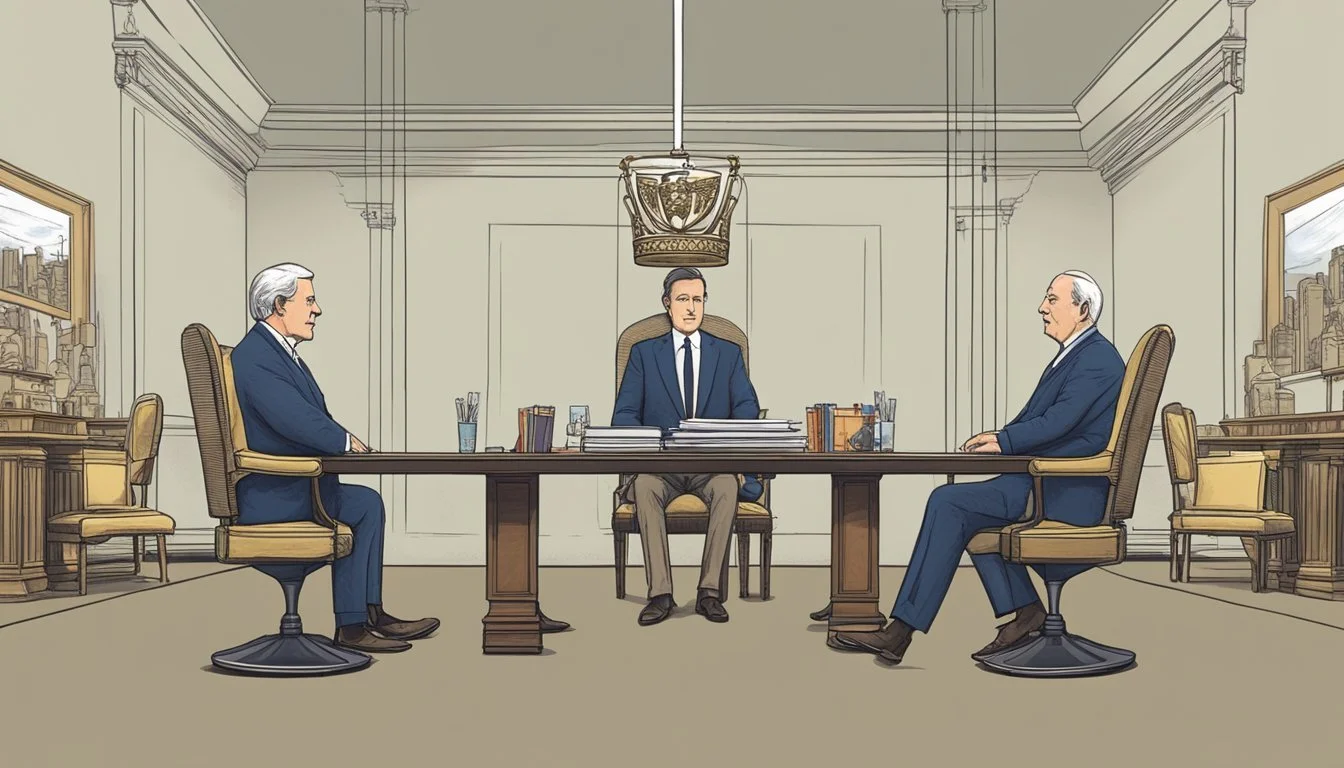13 Tips for Navigating Political Differences in a Relationship
Strengthening Bonds Amidst Disagreements
Navigating political differences in a relationship can be challenging, especially in the current polarized climate. Differing political views can spark intense emotions and conflicts, making it essential for couples to find ways to manage these differences effectively. How do partners maintain a healthy relationship despite these political divides?
Understanding and respecting each other's perspectives can help foster a stronger connection. Couples need strategies to communicate openly and compassionately, ensuring that political differences do not erode the foundation of their relationship. In this article, you will find practical tips to help you and your partner navigate political differences and maintain a harmonious relationship.
1) Practice Active Listening
Active listening requires fully focusing on your partner's words without interruption. This approach helps foster a sense of respect and understanding.
When discussing political differences, it is crucial to put aside your own opinions temporarily. Concentrate on what your partner is saying to ensure they feel heard. This can defuse potential conflicts and lead to more productive conversations.
Reflecting back on what your partner says can be useful. Phrases like "What I hear you saying is..." can clarify misunderstandings and confirm that you understand their viewpoint correctly.
Avoid formulating a response while your partner is speaking. Instead, give them your full attention to validate their feelings and opinions. This practice of active listening can create a more harmonious environment.
Active listening also involves observing non-verbal cues. Body language and facial expressions can indicate whether a partner feels misunderstood or agitated. Recognizing these signs can help steer the conversation in a more positive direction.
By prioritizing active listening, couples can navigate political differences more constructively. For more details, visit this resource on political differences in relationships.
2) Respect Differences
Respecting differences is crucial in navigating political disagreements in a relationship.
Each partner comes from a unique background, shaping their political views. Acknowledge these personal histories and recognize that differing opinions don't invalidate each other's experiences.
Avoid disparaging comments about each other's beliefs. Instead, foster open dialogues where both partners feel heard.
Establishing boundaries is also essential. Decide together on topics that may be too sensitive to discuss frequently. This helps in maintaining peace and respect within the relationship.
Incorporate active listening techniques to understand each other's perspectives better. This includes maintaining eye contact, nodding, and giving verbal acknowledgments.
Encourage each other to explain their viewpoints without interruptions. This approach allows for a deeper understanding and reduces defensiveness.
By consistently showing respect for each other's political differences, partners can build a stronger, more resilient relationship.
3) Find Common Ground
Identifying shared values is a crucial step in navigating political differences. List your top priorities and concerns, and encourage your partner to do the same. This exercise can reveal surprising similarities.
Focus on topics where you agree. These shared priorities offer a foundation from which to build understanding. Emphasize these areas during discussions to maintain a positive atmosphere.
Effective communication is essential. Keep an open mind and listen actively to your partner's views. This approach fosters respect and mutual understanding, making it easier to find common ground.
It's also helpful to engage in non-political activities together. Shared hobbies and interests can strengthen your bond and remind you of the reasons you value each other, irrespective of political beliefs.
4) Avoid Personal Attacks
In relationships, it's crucial to focus on the issue, not the person. When discussing political differences, attacking your partner's character can cause deep emotional harm and create a sense of mistrust.
Using "I" statements can help express feelings without blame. For instance, say "I feel concerned when..." rather than "You always...".
Personal attacks often escalate conflicts. Instead of listening and understanding, partners may become defensive. This can lead to a breakdown in communication and increased stress within the relationship.
Remaining calm and respectful, even in heated discussions, can foster a healthier, more constructive dialogue.
5) Set Boundaries
Setting boundaries is essential when handling political differences in a relationship. Clear boundaries help create a respectful environment where both partners can express their views without feeling attacked or dismissed.
Discuss with your partner the topics that may be too sensitive or heated to talk about. Agreeing to avoid these topics can prevent arguments and reduce stress.
Determine what is acceptable behavior during political discussions. For example, establish rules such as no yelling, name-calling, or interrupting. This helps maintain respect and understanding during conversations.
Consider designated times or places for political discussions. Avoid bringing up politics during family gatherings or when either partner is stressed. Choose a time when both are relaxed and willing to listen.
Respect each other's need for space. If feelings become too intense, either partner should feel comfortable in taking a break from the conversation. Agree on signals or phrases that indicate when a pause is needed.
Remember that setting boundaries is not about avoiding important discussions. It's about creating a safe space where both partners feel respected and heard. You can learn more about these strategies at Mindful Relationships.
6) Agree to Disagree
In relationships, political differences can spark intense debates. One practical approach is to agree to disagree. This strategy emphasizes mutual respect over consensus.
By agreeing to disagree, partners can set boundaries around sensitive topics. This helps prevent arguments that may damage the relationship. It's essential to recognize that disagreement does not equate to disrespect.
This approach also requires emotional maturity and open communication. Partners should feel comfortable expressing their views without fear of hostility. Listening actively and acknowledging the other's perspective fosters a supportive environment.
Moreover, agreeing to disagree means accepting that not every issue needs a resolution. Some differences are fundamental and will persist. Embracing this reality can bring peace and stability to the relationship.
For more tips on maintaining a healthy relationship despite differing views, visit First Things' guide on navigating political views in marriage. Cultivating empathy and respect remains crucial in these discussions.
Ultimately, agreeing to disagree allows partners to celebrate their individuality while maintaining harmony. It underscores the importance of love and respect, transcending political divides.
7) Seek Mediation
If political differences continue to create tension, seeking mediation can be a valuable step.
A neutral third party, such as a licensed counselor, can facilitate productive discussions. They help couples express their perspectives without escalating conflict.
Mediators provide strategies for better communication. This includes active listening and respectful dialogue, which can help couples understand each other more deeply.
For couples struggling with intense disagreements, mediation offers a structured environment. It ensures both parties feel heard and valued, reducing the emotional strain caused by political debates.
Professional mediators are trained to handle sensitive topics. They can guide conversations in a way that promotes mutual respect and constructive resolution. Both partners can benefit from their expertise.
8) Focus on Love
Emphasizing love can help navigate political differences in a relationship. When political tensions rise, focusing on the emotional connection can provide stability. Love and respect should be prioritized over political beliefs.
Shared values like honesty, kindness, and respect transcend political affiliations. These fundamentals forge strong bonds. By concentrating on these values, couples can find common ground despite their ideological differences.
Communication is key. Open and honest conversations can mitigate misunderstandings. Partners should express their feelings without judgment, fostering a safe space for dialogue.
Spending quality time together strengthens emotional ties. Engaging in enjoyable activities can shift attention away from divisive topics. The focus remains on the partnership rather than political discord.
Affirming each other’s individuality and perspectives is essential. Celebrating the unique views each person brings can enhance mutual appreciation. Recognizing that love is more profound than politics can help couples navigate through challenging conversations.
Physical touch, such as hugs and holding hands, can reinforce emotional connections. These moments remind partners of their affection and commitment, overshadowing political debates.
In essence, prioritizing love and understanding can help couples weather political differences. By valuing the relationship above all, partners can maintain harmony and respect.
9) Educate Yourself
Understanding the political landscape is crucial. Both partners should take the time to learn about the issues at hand. This helps build a foundation for more informed and respectful conversations.
Reading diverse sources is beneficial. Explore materials from multiple perspectives to get a well-rounded view. This practice can reduce misunderstandings and foster mutual respect.
Engage with credible sources. Reputable news outlets, academic papers, and expert analyses are good places to start. This ensures the information you share is accurate and trustworthy.
Attending forums and discussions can also be helpful. Engaging in community dialogues provides real-world insights that are often more nuanced than media portrayals.
By educating themselves, partners can debate issues more constructively. They become equipped to discuss politics without resorting to emotional disagreements. This builds a healthier relationship dynamic.
When partners understand each other's political views better, empathy grows. Taking the time to research and learn demonstrates commitment to the relationship. It shows that both parties value understanding over conflict.
10) Stay Calm
When discussing political differences, staying calm is crucial. Elevated emotions can quickly turn a conversation into a disagreement. Focus on maintaining a level-headed approach.
It helps to be mindful of your breathing. Deep, slow breaths can decrease stress and make it easier to listen effectively.
Taking short breaks during heated discussions can also be beneficial. Stepping away for a moment allows both individuals to gather their thoughts and return with a clearer mindset.
Remember, it’s okay to pause the conversation and revisit it later. Agreeing to a time-out prevents arguments from escalating beyond control. Re-engage the dialogue when both parties feel calmer and more prepared.
11) Be Open-Minded
Approaching political differences in a relationship requires an open mind. It's crucial to be willing to consider your partner's perspective without immediately dismissing their views. This mindset fosters a more respectful and understanding environment.
Being open-minded enables constructive conversations. It allows both parties to discuss their beliefs and concerns without fear of judgment or misunderstanding. This open dialogue can lead to deeper connections and shared growth.
Encouraging an atmosphere of curiosity rather than defensiveness is key. Seeking to understand why your partner holds certain political views can be illuminating. Ask questions that promote deeper insight rather than confrontation.
Reflecting on how your own beliefs were formed can also help. Recognizing that everyone's experiences contribute to their political stance helps in appreciating the diversity of thought within the relationship. This reflection can bridge gaps and build empathy.
Adopting open-mindedness doesn't mean abandoning your convictions. It's about balancing your views with a genuine interest in your partner's beliefs. This approach strengthens the relationship and fosters mutual respect.
For more on handling political differences with empathy and respect, you can visit this article.
12) Communicate Clearly
Clear communication is essential in any relationship, especially when discussing political differences. It's important to articulate thoughts without ambiguity. This helps in reducing misunderstandings and fosters a healthy dialogue.
Speak with respect and empathy. Use "I" statements to express personal feelings and avoid blame. For example, say "I feel concerned about this issue" instead of "You always support that policy."
Take turns speaking and actively listen. Ensure that both partners have an opportunity to voice their perspectives. This ensures a balanced conversation and promotes mutual understanding.
Avoid interrupting or raising your voice. These actions can escalate tensions and derail productive discussions. Keeping a calm tone helps in maintaining a constructive atmosphere.
If the conversation becomes too heated, take a break. Stepping away can prevent arguments from becoming destructive, allowing both parties to return to the discussion calmly.
Utilize non-verbal communication. Body language, facial expressions, and eye contact contribute significantly to how messages are received. Positive body language can reinforce supportive and understanding dialogue.
For more tips on managing political differences, check out this guide on navigating political differences in marriage.
13) Take Breaks
Taking breaks when discussing political differences can be essential for maintaining a healthy relationship. Heated debates can escalate quickly, causing stress and frustration for both partners.
A pause can allow individuals to cool down and reflect on their thoughts. It helps in preventing arguments from spiraling out of control.
By stepping away from the discussion, partners can gather their thoughts more clearly. This can lead to more productive conversations later on.
Breaks can also be used for self-care. Doing something enjoyable or relaxing can help reset emotions and reduce tension.
By recognizing when a conversation is becoming too intense and choosing to take a break, partners show respect for each other's emotional well-being. Regularly incorporating breaks can make difficult conversations more manageable in the long run.
Understanding The Roots Of Political Differences
Political differences in relationships often stem from deeply ingrained beliefs shaped by ideological backgrounds and personal experiences. These roots help explain why such differences can be challenging to navigate.
Ideological Backgrounds
Ideological backgrounds play a significant role in shaping political views. These backgrounds include the core values and beliefs that individuals hold, which are often influenced by cultural, religious, and historical contexts.
People may gravitate toward ideologies that resonate with their personal values, such as liberty, equality, or tradition. For instance, a person who values social equity may lean towards more progressive politics, while someone who prioritizes economic freedom might prefer conservative views. Understanding these ideologies can help partners see beyond surface-level disagreements.
It's essential to recognize that these ideologies are not static. They can evolve over time due to life experiences, exposure to different perspectives, and changing societal norms. Therefore, engaging in open dialogue about these ideological roots can promote mutual respect and empathy in a relationship.
Role Of Upbringing And Education
Upbringing and education significantly influence political beliefs. From a young age, individuals are exposed to political ideas through their family environment, schooling, and community interactions. Parents and guardians often shape initial political views, consciously or unconsciously, through discussions and modeled behaviors.
Education plays a role as well. Schools and universities can introduce individuals to various political theories and histories. Access to diverse viewpoints in educational settings can either reinforce pre-existing beliefs or encourage new ones.
Peers also impact political views during formative years. Friendships and social circles can validate or challenge political ideologies, further molding one’s political stance. Recognizing the influence of upbringing and education on political differences can help couples appreciate that these beliefs are deeply rooted in their personal history and development.
Effective Communication Strategies
When managing political differences in a relationship, effective communication is essential. Key strategies include active listening and maintaining non-confrontational dialogue. These methods can enhance mutual understanding and respect between partners.
Active Listening
Active listening involves fully concentrating on what your partner is saying, rather than passively hearing the message. It requires avoiding interruptions and providing feedback through nods or brief verbal affirmations. This demonstrates respect and attentiveness.
Using open-ended questions can facilitate deeper discussions. Phrases like "Can you explain your perspective?" encourage your partner to share more, promoting a richer understanding. Reflecting back what you’ve heard also ensures clarity and shows empathy, such as, "It sounds like you’re concerned about...".
Maintaining eye contact and demonstrating genuine interest can further strengthen the connection. This practice minimizes misunderstandings and shows that both partners value each other's opinions.
Non-Confrontational Dialogue
Non-confrontational dialogue focuses on discussing political differences without aggression or criticism. Rather than aiming to win an argument, the goal is mutual understanding and respect. Framing conversations with “I” statements, such as "I feel" or "I believe", helps prevent a defensive reaction from your partner.
Setting boundaries and agreeing on discussion times can also help. Agreeing to pause a conversation when emotions run high provides space to cool down and return with a calmer mindset. Both partners should ensure to avoid personal attacks and focus on the topic at hand.
Creating a safe space for these discussions is crucial. This means fostering an environment where both partners feel heard and respected, regardless of differing political views.
Building A Supportive Environment
Creating a supportive environment in relationships with political differences involves prioritizing respect and empathy while also striving to establish common goals. These elements help build a foundation of mutual understanding and shared purpose.
Respect And Empathy
Respect and empathy are crucial when navigating political differences. He or she must actively listen to their partner's viewpoints without interruption. By approaching conversations with curiosity and asking open-ended questions, they can better comprehend the underlying values driving their partner's opinions.
Respect extends to recognizing that differing political beliefs do not diminish the other person's worth. Demonstrating empathy by acknowledging their emotions and experiences builds trust. It is also important to avoid derogatory comments or dismissive attitudes, which can escalate tensions.
To practice empathy, one can reflect on times they held opposing views and what changed their perspective. By connecting on a human level, they can move beyond political labels and focus on shared humanity. Using “I” statements can also express personal feelings without assigning blame.
Creating Common Goals
Establishing common goals is a proactive step in mitigating political discord. Couples who focus on shared objectives can find common ground despite their differences. Identifying areas of mutual interest, such as volunteering for community projects or planning future travel, creates a sense of unity.
When setting goals, they should ensure the targets are meaningful to both partners. Discussing values openly can reveal overlapping beliefs that can be the foundation for these goals. This process fosters collaboration and reduces the focus on divisive political topics.
Regularly revisiting and updating goals keeps the relationship dynamic and aligned. Goals also provide a constructive outlet for energy that might otherwise fuel political arguments. They serve as a reminder that the relationship's success is a joint effort, transcending political disputes.









